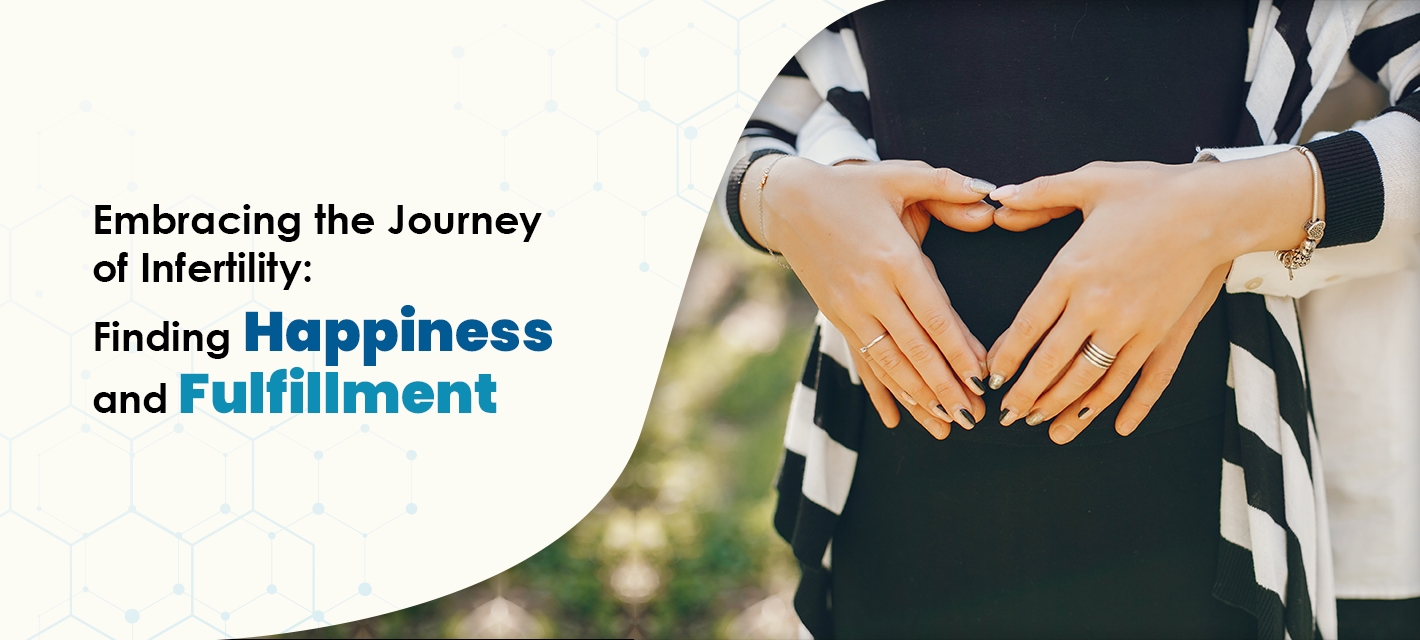
Journey towards parenthood
Infertility and childlessness can be challenging journeys for couples to navigate. The emotional and physical toll of trying to conceive can be overwhelming, and it can be difficult to find happiness and contentment in the midst of such a challenging situation. However, it is possible to find joy and fulfilment even in the face of infertility. Explore ways that can find you happiness and contentment in their journey of infertility and childlessness.
Focus on the present moment: One of the biggest challenges of infertility is the uncertainty about the future. If you too are struggling to conceive as a couple you may find yourselves constantly worrying about what the future holds, whether they will ever conceive, and what their lives will look like without children. However, focusing on the present moment can help alleviate some of this anxiety. By focusing on the here and now, couples can enjoy their time together without worrying about what the future may bring.
Build a strong support system: Battling infertility can be an isolating experience, but it doesn’t have to be. Building a strong support system can help couples feel less alone and more supported in their journey. This may include reaching out to family and friends, joining a support group, or seeking professional help from a therapist.
Find new hobbies and interests: Infertility can consume a lot of time and energy, but it’s important for couples to find other hobbies and interests outside of trying to conceive. This can help them feel fulfilled and engaged in other areas of their lives, and can also provide a welcome distraction from the stress of infertility.
Nurture your relationship: Infertility can be a strain on even the strongest relationships, but it’s important for couples to prioritize their relationship and continue to nurture it. This may mean scheduling date nights, taking weekend getaways, or simply spending quality time together.
Consider alternative paths to parenthood: While parenting may be a common goal for many couples, there are alternative paths to consider when traditional conception is not possible or desirable. Some of these alternatives include adoption, fostering, and co-parenting. Adoption involves legally taking on the care and responsibility of a child who is not biologically related to the adoptive parents. Fostering involves caring for a child temporarily or long-term, providing a safe and stable environment for a child in need. Co-parenting involves sharing parenting responsibilities with another individual or couple, often to create a supportive and cooperative family unit. These alternatives offer couples the opportunity to build a family in a way that works for them, while still experiencing the joys and challenges of parenthood.
Practice self-care: Infertility can be an emotionally and physically demanding experience, so it’s important for couples to prioritize self-care. This may include getting enough sleep, eating well, exercising regularly, and engaging in activities that bring them joy and relaxation.
Seek out resources and information: Infertility can be a complex and confusing topic, but there are many resources available to help couples navigate the journey. This may include talking to a doctor, researching treatment options, or reading books and articles on the subject.
Try other forms of parenting: In addition to traditional human parenting, there are many other forms of “parenting” that people can engage in to bring joy and purpose to their lives. One popular alternative to human parenting is pet parenting. Many people consider their pets to be like family members and take on the responsibility of caring for them, providing them with love and attention, and meeting their needs for food, water, exercise, and healthcare. Pet parenting can bring a great deal of joy and companionship to people’s lives, as well as provide opportunities for exercise, outdoor activities, and social interaction.
Another form of alternative parenting is plant parenting. This involves taking care of and nurturing plants, either indoors or outdoors. Plant parenting can be a fulfilling hobby that allows people to connect with nature, create beautiful living spaces, and develop a sense of responsibility for the care and maintenance of living things. It can also be a form of stress relief and relaxation, as well as an opportunity for learning and exploration.
Other forms of alternative parenting may include caring for animals or plants in the wild, volunteering with children or animals, or even mentoring and supporting younger individuals who may not have parental figures in their lives. These alternative forms of parenting can provide people with a sense of purpose, fulfilment, and joy, even if traditional human parenting is not an option or preference.
Final Words!
Infertility and childlessness can be challenging journeys for couples, but it’s possible to find happiness and contentment along the way. By focusing on the present moment, building a strong support system, finding new hobbies and interests, nurturing their relationship, considering alternative paths to parenthood, practicing self-care, and seeking out resources and information, couples can navigate this journey with grace and resilience.
To the couples who have exhausted themselves with repeated fertility treatments but are still struggling to become parents, know that your life can still be complete, regardless of whether or not you have children. It’s understandable to feel discouraged and disheartened, but remember that there are countless paths to happiness and fulfilment. It’s okay to take a break from fertility treatments and focus on other aspects of your life, such as your relationship, hobbies, and personal growth. Parenthood is not the only way to lead a meaningful life, and it’s important to prioritize your own well-being and happiness, both as individuals and as a couple. Know that you are not alone in this journey, and there are resources and support available to you, whatever path you choose.
